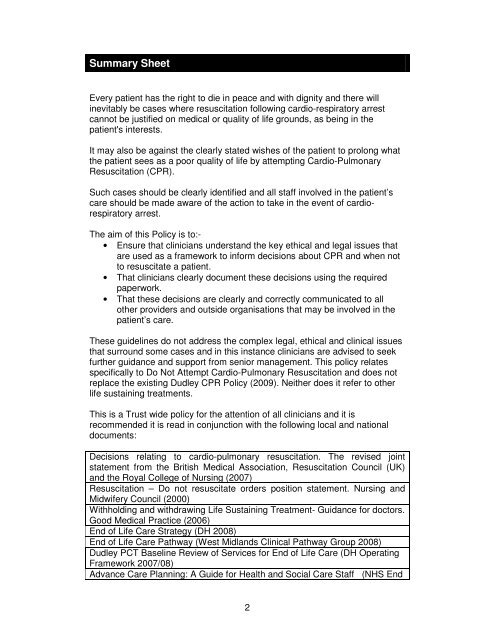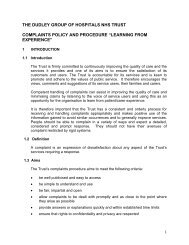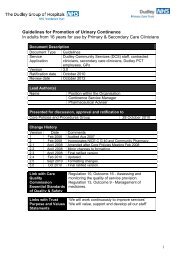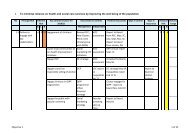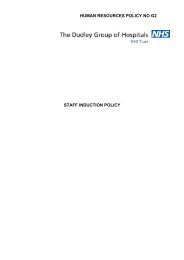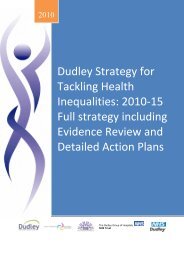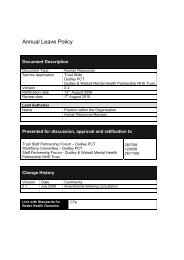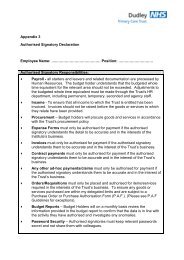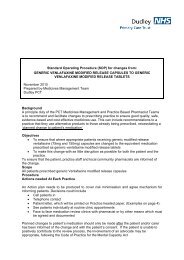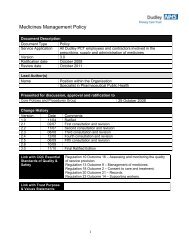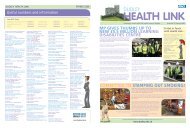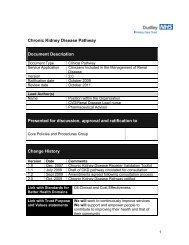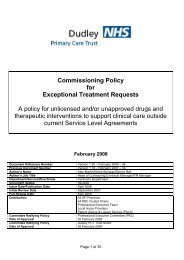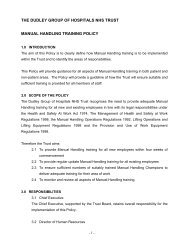Do Not Attempt Resuscitation (DNAR) Policy - Dudley Primary Care ...
Do Not Attempt Resuscitation (DNAR) Policy - Dudley Primary Care ...
Do Not Attempt Resuscitation (DNAR) Policy - Dudley Primary Care ...
You also want an ePaper? Increase the reach of your titles
YUMPU automatically turns print PDFs into web optimized ePapers that Google loves.
Summary Sheet<br />
Every patient has the right to die in peace and with dignity and there will<br />
inevitably be cases where resuscitation following cardio-respiratory arrest<br />
cannot be justified on medical or quality of life grounds, as being in the<br />
patient's interests.<br />
It may also be against the clearly stated wishes of the patient to prolong what<br />
the patient sees as a poor quality of life by attempting Cardio-Pulmonary<br />
<strong>Resuscitation</strong> (CPR).<br />
Such cases should be clearly identified and all staff involved in the patient’s<br />
care should be made aware of the action to take in the event of cardiorespiratory<br />
arrest.<br />
The aim of this <strong>Policy</strong> is to:-<br />
• Ensure that clinicians understand the key ethical and legal issues that<br />
are used as a framework to inform decisions about CPR and when not<br />
to resuscitate a patient.<br />
• That clinicians clearly document these decisions using the required<br />
paperwork.<br />
• That these decisions are clearly and correctly communicated to all<br />
other providers and outside organisations that may be involved in the<br />
patient’s care.<br />
These guidelines do not address the complex legal, ethical and clinical issues<br />
that surround some cases and in this instance clinicians are advised to seek<br />
further guidance and support from senior management. This policy relates<br />
specifically to <strong>Do</strong> <strong>Not</strong> <strong>Attempt</strong> Cardio-Pulmonary <strong>Resuscitation</strong> and does not<br />
replace the existing <strong>Dudley</strong> CPR <strong>Policy</strong> (2009). Neither does it refer to other<br />
life sustaining treatments.<br />
This is a Trust wide policy for the attention of all clinicians and it is<br />
recommended it is read in conjunction with the following local and national<br />
documents:<br />
Decisions relating to cardio-pulmonary resuscitation. The revised joint<br />
statement from the British Medical Association, <strong>Resuscitation</strong> Council (UK)<br />
and the Royal College of Nursing (2007)<br />
<strong>Resuscitation</strong> – <strong>Do</strong> not resuscitate orders position statement. Nursing and<br />
Midwifery Council (2000)<br />
Withholding and withdrawing Life Sustaining Treatment- Guidance for doctors.<br />
Good Medical Practice (2006)<br />
End of Life <strong>Care</strong> Strategy (DH 2008)<br />
End of Life <strong>Care</strong> Pathway (West Midlands Clinical Pathway Group 2008)<br />
<strong>Dudley</strong> PCT Baseline Review of Services for End of Life <strong>Care</strong> (DH Operating<br />
Framework 2007/08)<br />
Advance <strong>Care</strong> Planning: A Guide for Health and Social <strong>Care</strong> Staff (NHS End<br />
2


